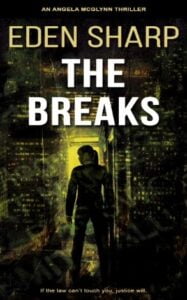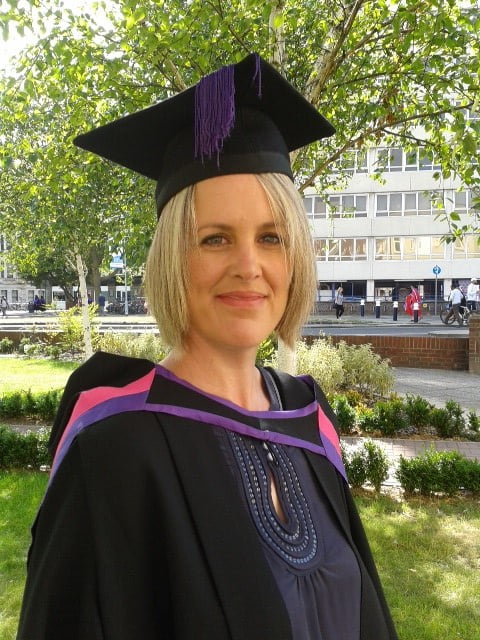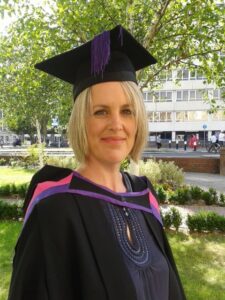Eden Sharp, author and associate lecturer in fiction writing and publishing
Are you wondering whether studying for a creative writing degree will improve your success as an indie author? It's a decision any self-published author should not take lightly, given the amount of time and money involved. Eden Sharp, associate lecturer in fiction writing and publishing at Southampton Solent University, shares her views on what aspiring writers should look for in a university course.
Creative writing degrees have been prevalent in the US for over a century and now with a plethora of offerings from academic institutions, everywhere else seems to be catching up fast.
The notion that somehow creative writing can’t be taught has lingered. This has always struck me as idiocy akin to suggesting the old masters merely needed to be furnished with art materials and instructed to go and daub in order to produce great works. It also devalues creative writing, allowing for the impression it is not a highly technical craft that requires instruction, mentorship and conducive practice amongst peers.
What is Creative Writing Anyway?
As well as disavowing the idea it cannot be taught, I also object to the term ‘creative writing’ itself. What does it really denote? I could address an envelope by writing the addressee’s name and street details in a spiral pattern that would render it creative and so I prefer the term fiction writing for this is what it encompasses. This can then further be broken down into sub-categories of short story writing, novel writing, screenwriting, etc and may even include creative non-fiction.
I am reminded of a Norman Thelwell book from my childhood which advises that before choosing a suitable pony one must first choose a suitable expert, and so it is with choosing a suitable writing course. What is being offered in exchange for a considerable amount of investment must be carefully considered.
My advice would be this:
Alongside the prerequisite craft and technical elements there must be heavy emphasis on the professional and industrial context to produce author-entrepreneurs equipped to understand the radical changes the publishing industry has been through and how best to profit from them.
Case Study of a Course

Practising what she preaches: one of Eden Sharp's crime thrillers
At my own institution, Southampton Solent University, students explore literary texts and learn the craft of writing for a range of industries, developing creative talent and laying the foundations to prepare for a career. The course has a strong focus on employability, and in the second year students publish their work either independently or via the University, as well as working on live briefs from real-world clients thereby learning marketing skills along the way. Teaching is delivered by an academic team which includes researchers and industry professionals, with published work, many of whom continue to actively write within their respective industries.
So if you are looking for a course there are certain questions I feel you should be asking:
- Do I wish to earn my living as an author?
- If so, does the course provider offer industry knowledge and business experience as well as teaching craft?
- Will instruction be provided by those with experience of the industry?
Do Creative Writing Courses Qualify You to Teach?

Will your degree equip you to take the hot seat?
Some courses even offer the carrot of instructing students on how to teach alongside their craft modules. The idea of earning a living teaching whilst pursuing one’s own writing is popular, but in my experience, and in that of several other teachers I know, any accredited institution will require a post-graduate teaching qualification on top of a subject-specific degree. Even in securing community arts-based positions, you will find those with such qualifications are favoured.
Viable Alternatives
If you’re looking for a course solely for the pleasure of writing, workshopping with peers is really valuable. Critiquing the work of others is a great way to learn about your own technique. If this is your only aim, there are writers’ groups both locally and online that could provide this. Combine this with a good craft book and save yourself time and money. If however you are serious about undertaking academic study, it is imperative to ensure the institutions you are exploring view the business side of their offer the same way.
OVER TO YOU If you've taken a creative writing degree, how useful has it been in your subsequent career? Would you recommend your course? Do you have any further advice you'd like to add to Eden's?
Authors - should you be taking a creative writing degree? @EdenSharp advises on which to choose Share on XRELATED POSTS
- How Triskele authors created their own online writing course – by Jill Marsh
- Are writers born or made? – by Debbie Young
- Why you should never stop growing as an author – by Eliza Green






[…] Opinion: What To Look for in a University Creative Writing Course […]
Enjoyed the blog. But, I’m going to tell you the skinny: Every single university course that teaches creative writing pushes literary content and not popular fiction. Writing a novel or a novella or a short story or even non-fiction is the very beginning. All of which are products. Publishing is a business industry. Courses do NOT teach how to publish a book, how to promote, how to revise, how to compose a book description, or how to submit a book for promotion or how to gather organic reviews. Editors and beta readers are seldom invited into the classroom to share their expertise. I am a founder of a small organization. Among the members are English department chairs of major universities, a NASA scientist and more than a few PhDs. None of whom knew how to market and sell a book, hire a cover artist, or compose a book description that featured the story arc. Moreover, when I looked at the books, I sent several to competent editors. Every single author who came out of academia created a curriculum vitae as an author bio. I had to tell these folk they were not interviewing for a job. Here is what I know: You can teach craft. But you cannot teach storytelling. The question is never: Can I write? The question is always: Can I tell a story? The storyteller will always succeed because the reader is enthralled, even if Oxford commas are misused or misplaced. Cindy Marsch is correct. An instructor of creative writing must have his or her hands on the ever-changing pulse in the publishing industry. Not only legacy publishing, but digital and indie authorship as well. Wishing you success.
Well said! Story and an original voice is what it’s all about.
My specialism is in popular fiction. I teach how to publish a book, how to promote, how to create a cover and write a blurb and promote a book including content marketing and email subscriptions on a unit entitled The Business of Independent Publishing. We then publish books that have been edited and produced in house with all the relevant skills taught over a whole academic year. We have industry specialists in house. You can teach craft and that includes storytelling. I focus heavily on structure and character arcs and the aim is always to strive to bring out an original voice. Students graduate with all of this and in-depth up-to-date industry knowledge.
I studied full time for an MA Professional Writing at Falmouth University in Cornwall in 2011/12.
I am pleased that I did it, I wouldn’t have completed my first book if I hadn’t. The course was professional and realistic in terms of making a living out of writing. It taught me craft, introduced me to the different forms of writing and the strengths needed to succeed in that area:Fiction, non-fiction, screenplay, professional/ freelance. I discovered my natural forte, creative non-fiction through this route. I suppose also it gave me that indefinable concept of confidence, that I could be a writer.
The investment in time and money was significant and I have only just finished repaying my career loan Was it worth it? I will tell you in 10 years time.
I very much saw the MA as a Second Chance in Life for me to have a second career in writing and teaching creative writing and I blogged about my experiences at Falmouth-see link below.
Still trying to crack the teaching aspect, although I have also retrained as a Teacher of English as a Foreign Language and am pitching the idea of a Nature Creative Writing course.
I also wrote a piece for ALLI on this subject that may be useful. It includes some feedback from fellow MA students, 1 year on from completing the course.
https://selfpublishingadvice.org/what-makes-a-writer-nature-or-nurture/
Paul
I loved my MA in Creative Writing, which I took some ten years ago at Bath Spa University. It made me into the wrier I am today and gave me the confidence to pursue a career in publishing.
But to be absolutely frank, I only chose Bath because it was the closest place where I lived at the time to offer such a course. I was lucky in that the course was a very well taught one. I didn’t know much about creative writing or the publishing industry before I began, and would have not been able to evaluate the course in a sensible way even though Id already completed an MA in Economics a few years earlier.
I think this is the crux of the matter, which is why it’s so important to publish posts like this for anyone considering an MA.
I think the need for industry savvy in an MFA curriculum is vital. That was an emphasis for one friend in her painting MFA with Savannah College of Art and Design. But another friend’s MFA in creative writing with a small city university came with outdated ideas about publishing. She has really big loans to pay off and nothing much published yet. They really need to be actively up-to-date in an industry that is changing rapidly. A solid MFA for creative writing will also take SERIOUSLY the independent publishing option!
Great piece–thanks!